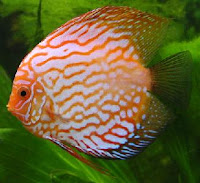If you are into tropical fish, you may have already heard about Discus Fish Secrets. It is currently the #1 ebook available for the keeping and breeding of discus fish. For those who love discus, you probably have found that it's hard to find specific information from an experienced source. This book is a complete step-by-step guide to caring for, raising, and breeding discus fish, and is full of practical advice to help you to raise happy and healthy fish.
Discus Fish Secrets was written by tropical fish enthusiast, Rob Clark. Rob has kept and bred discus fish for more than 10 years, and has substantial first hand knowledge of what works and what doesn't.
The book covers topics such as what size tank is best for discus, filtration methods and tricks for getting the cleanest possible water, and what types of discus are best for beginners. The manual also discusses what foods are best for discus, how much they should be fed, and how often.
In case you are interested in breeding, Discus Fish Secrets has got that covered. Rob discusses how to tell when your discus fish are ready to breed, gives several common mistakes to avoid when breeding, and even how to care and raise fry into strong discus.
In addition to the book, there is some bonus information included. You will learn how to artificially raise fry away from their parents so that the eggs aren't eaten by the adults. You will discover a unique method to setting up a discus hatchery that will save you a ton of electricity. And finally, if you live in hard water areas, Rob has an all natural way to reduce hardness to discus loving levels.
If you are new to discus fish, or if you have tried breeding unsuccessfully in the past, Discus Fish Secrets is a great resource to have. It contains practical advice and information from an experienced expert who has organized everything for you in one place. Truly a must have for discus fish lovers.
Article Source: http://www.articlesbase.com/pets-articles/discus-fish-books-a-quotdiscus-fish-secretsquot-review-643997.html
About the Author
Mark Grover is an aquarium enthusiast with over 5 years keeping discus fish.


